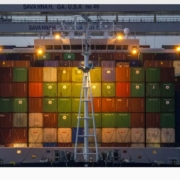45,000 East Coast dockworkers are set to go on a major strike, with estimated daily losses of up to 5 billion US dollars.
Vehicles move in and out of the Port of Baltimore. On October 1st, a major strike is set to begin at the busiest ports on the East Coast and Gulf Coast of the United States. This would mark the first East Coast dockworker strike since 1977, affecting approximately half of the nation’s seaports.
Harry Katz, a professor at Cornell University’s School of Industrial and Labor Relations, believes, “Dockworkers faced severe inflation during the pandemic, and the terms of the collective bargaining agreement did not fully compensate for it. They feel it’s time to be rewarded. Many dockworkers continued to work during the pandemic, unlike many who could work remotely. They feel they deserve a reward.” The International Longshoremen’s Association, representing over 45,000 dockworkers at more than 30 ports from Maine to Texas, is demanding a 77% wage increase in a new six-year contract. This translates to a $6 hourly raise each year, increasing hourly wages from $39 to $69 to offset the impact of soaring inflation in recent years. To protect their members’ jobs, they are also demanding a complete ban on automation of cranes, gates, and container movement for loading and unloading cargo. With no plans for negotiations before the midnight deadline on September 30th, a strike seems imminent.
Katz added, “I speculate the strike will last 4 to 6 weeks, but I don’t expect it to be longer. They will face immense pressure to resolve the issue.”
Shipping companies have stated that if a strike occurs for one day, it would take about 4 to 6 days for the supply chain to fully process the accumulated cargo. If the strike is prolonged for a week, or even until the end of China’s National Day holiday, it would have a significant impact, disrupting the logistics chain and causing port congestion. Economists warn that each day of the strike could result in up to $5 billion in economic losses. However, with the U.S. presidential election just over a month away, President Biden has stated he will not intervene.
When asked, “Mr. President, if the dockworkers go on strike on Tuesday, will you intervene?” U.S. President Biden responded, “No, because this is collective bargaining between labor and management. I do not believe in the Taft-Hartley Act.” The Taft-Hartley Act Biden referred to allows the president to impose an 80-day cooling-off period during labor disputes that threaten national security, essentially forcing workers back to their jobs while negotiations continue.
News from: 公視新聞網

 マースク、フランス初の倉庫を開設
マースク、フランス初の倉庫を開設


